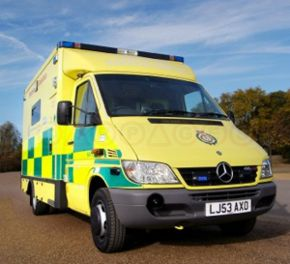
A student nurse who died after waiting almost five hours for an ambulance could have been saved if she had got to hospital sooner, a coroner has ruled.
Lisa Day had a heart attack after being forced to wait five hours for an ambulance (Coulter Partnership /PA Wire)
A student nurse who died after waiting almost five hours for an ambulance could have been saved if she had got to hospital sooner, a coroner has ruled.
Lisa Day, 27, a type 1 diabetic, fell severely ill on September 7 last year and spent the day vomiting blood and complaining of a headache and stomach pains, St Pancras Coroner’s Court heard.
London Ambulance Service was struggling to cope with “extreme demand” and did not have enough ambulances to send to patients, the court heard.
An ambulance eventually arrived at 10.30pm after Miss Day suffered a cardiac arrest and fell unconscious. She was taken to hospital but never regained consciousness and died five days later from a lack of oxygen to the brain stem.
Coroner Mary Hassell said: “The reason for the approximate four and a half hour delay in an ambulance attending was because demand outstripped capacity.
“If Lisa had received definitive hospital care before she suffered a cardiac arrest in the evening of September 7, the likelihood is she would have survived.”
Speaking after the inquest through tears, Miss Day’s mother Doreen Proud said: “She should still be here. What can I say? It’s every mother’s nightmare.”
She later added: “I’m never going to get over this, no mother would.
“As a mum, your kids come first. No matter what happens you are always a mum.”
Asked if she thought she had justice now, she said: “It is helping everyone else but it can’t bring my daughter back.”
Miss Day’s sister Katie Edwards said: “She was completely let down.”
The court heard that Miss Day was assessed by NHS Direct 111 call handlers as DX012, meaning that an ambulance should have been with her within 30 minutes.
But the London Ambulance Service was “remarkably busy” that day – a fact the 111 call handlers were aware of – and did not arrive until nearly five hours later.
Susan Watkins, the head of quality assurance at the London Ambulance Service who reviewed the case, said the service was struggling with “extreme demand”.
She told the inquest: “On the day in question we faced increased levels of demand for the service. Incoming calls exceeded the amount of resources we had available – operational resourcing was low.
“We were receiving over 300 calls an hour in the hour we got the call from Lisa.”
More than 200 patients were waiting for an ambulance along with Miss Day, the inquest a heard.
The ambulance service was under such strain it upgraded its operations to ‘purple-enhanced’ – the third most serious category behind ‘black’ which denotes “catastrophic” conditions.
This meant that calls were redirected to other agencies such as 111, and saw staff who usually ring back patients waiting for an ambulance are redeployed to take emergency 999 calls.
Miss Watkins said: “Significant pressures were on the service we couldn’t reach our immediately life-threatened patients.
“Obviously there was a delay to an ambulance being sent to Lisa. While we are handling calls that are being held there should be further ring backs made to the patient.
“On the day in question there were two staff allocated to ring backs for all the calls waiting and sadly there was a delay in the ring backs.
“There just weren’t the people to ring back patients, they should be done but in those circumstances of extreme capacity we redeploy handlers.”
Miss Day, who lived in Fortune Green, West Hampstead, north London, was staying at a friend’s house when she fell ill on the morning of September 7.
The day before, her glucose levels had been so high they were off the chart, the court heard.
Her friend Luke Halliburton, an acting sergeant with the Met Police, phoned NHS Direct shortly after 5pm and a request for an ambulance was formally made at 5.49pm.
By 10.15pm an ambulance had not arrived and the service made a long-delayed call back checking Miss Day’s symptoms had not changed.
Eight minutes later her friend called 999 after discovering Miss Day had lost consciousness and suffered a cardiac arrest.
She was taken to the Royal Free Hospital but never regained consciousness and died five days later from lack of oxygen to the brain caused by diabetic ketoacidosis – complications arising from her diabetes.
Miss Day had been due to start training as a nurse at City University in London days after the incident.
The coroner delivered a narrative verdict.
Speaking after the inquest, Miss Day’s brother-in-law Matthew Edwards blamed her death on the under-resourcing of London Ambulance Service.
He said: “We are extremely saddened by Lisa’s death, and the sadness will last with us now until the rest of our lives.
“We believe the death was completely avoidable and ultimately resulted from the under-resourcing of the ambulance service in London. I hope these lessons will be learnt and this case will not happen again.”
The family said they will continue to campaign to raise awareness of the dangers of diabetes.
London Ambulance Service deputy director of operations Peter McKenna said: “We would like to once again offer our sincere condolences to the family of Lisa Day.
“We will carefully consider the recommendations of the coroner’s court so we can deliver the best care to our patients.
“We have also completed our own internal investigation into the circumstances of Lisa’s death. The findings of this investigation have been presented to the Day family.”